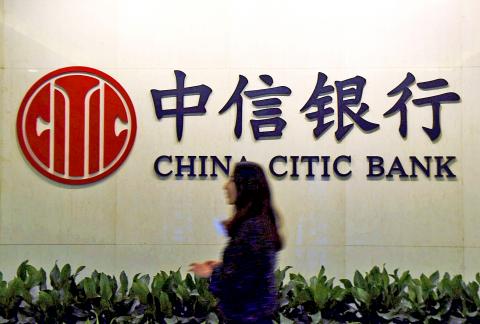A Chinese state-owned investment firm has provided a US$10 billion credit line for Iranian banks, Iran’s central bank president said on Saturday.
The contract was signed in Beijing between CITIC (中國中信) investment group and a delegation of Iranian banks led by central bank president Valiollah Seif.
The Iran Daily said the funds would finance water, energy and transport projects.

Photo: Reuters
Iran is vital to China’s trade ambitions as it develops its trillion-dollar “One Belt, One Road” strategy aimed at dramatically boosting its ties to Europe and Africa.
China is already Iran’s biggest oil customer and accounts for one-thirds of its overall trade.
Bilateral trade was just US$31 billion last year, but the figure jumped more than 30 percent in the first six months of this year.
In addition to the credit line, the Export-Import Bank of China (中國進出口銀行) committed to a further US$10 billion in loans, while the China Development Bank (中國國家開發銀行) signed preliminary deals with Iran for US$15 billion in infrastructure and production projects, Seif said.
The contracts reflect “a strong will for continuation of cooperation between the two countries,” Seif said.
In total, China has agreed to allocate US$35 billion in financing and loans for Iran’s economy, state news agency IRNA quoted Seif as saying.
The credit line will use euros and yuan to help bypass US sanctions that have continued, despite the nuclear deal between Iran and world powers in 2015.
Since the lifting of sanctions, Beijing has opened two credit lines worth US$4.2 billion to build high-speed railway lines linking Tehran with Mashhad and Isfahan, the Iran Daily reported.
The latest move follows an 8 billion euro (US$9.56 billion) credit deal signed with South Korea’s Exim bank last month.
European banks remain wary of penalties from Washington for working with Iran, but talks are said to be at an advanced stage for US$22 billion in credit deals with banks from Austria, Denmark and Germany.

Taiwan’s exports soared 56 percent year-on-year to an all-time high of US$64.05 billion last month, propelled by surging global demand for artificial intelligence (AI), high-performance computing and cloud service infrastructure, the Ministry of Finance said yesterday. Department of Statistics Director-General Beatrice Tsai (蔡美娜) called the figure an unexpected upside surprise, citing a wave of technology orders from overseas customers alongside the usual year-end shopping season for technology products. Growth is likely to remain strong this month, she said, projecting a 40 percent to 45 percent expansion on an annual basis. The outperformance could prompt the Directorate-General of Budget, Accounting and

Two Chinese chipmakers are attracting strong retail investor demand, buoyed by industry peer Moore Threads Technology Co’s (摩爾線程) stellar debut. The retail portion of MetaX Integrated Circuits (Shanghai) Co’s (上海沐曦) upcoming initial public offering (IPO) was 2,986 times oversubscribed on Friday, according to a filing. Meanwhile, Beijing Onmicro Electronics Co (北京昂瑞微), which makes radio frequency chips, was 2,899 times oversubscribed on Friday, its filing showed. The bids coincided with Moore Threads’ trading debut, which surged 425 percent on Friday after raising 8 billion yuan (US$1.13 billion) on bets that the company could emerge as a viable local competitor to Nvidia

BARRIERS: Gudeng’s chairman said it was unlikely that the US could replicate Taiwan’s science parks in Arizona, given its strict immigration policies and cultural differences Gudeng Precision Industrial Co (家登), which supplies wafer pods to the world’s major semiconductor firms, yesterday said it is in no rush to set up production in the US due to high costs. The company supplies its customers through a warehouse in Arizona jointly operated by TSS Holdings Ltd (德鑫控股), a joint holding of Gudeng and 17 Taiwanese firms in the semiconductor supply chain, including specialty plastic compounds producer Nytex Composites Co (耐特) and automated material handling system supplier Symtek Automation Asia Co (迅得). While the company has long been exploring the feasibility of setting up production in the US to address

OPTION: Uber said it could provide higher pay for batch trips, if incentives for batching is not removed entirely, as the latter would force it to pass on the costs to consumers Uber Technologies Inc yesterday warned that proposed restrictions on batching orders and minimum wages could prompt a NT$20 delivery fee increase in Taiwan, as lower efficiency would drive up costs. Uber CEO Dara Khosrowshahi made the remarks yesterday during his visit to Taiwan. He is on a multileg trip to the region, which includes stops in South Korea and Japan. His visit coincided the release last month of the Ministry of Labor’s draft bill on the delivery sector, which aims to safeguard delivery workers’ rights and improve their welfare. The ministry set the minimum pay for local food delivery drivers at